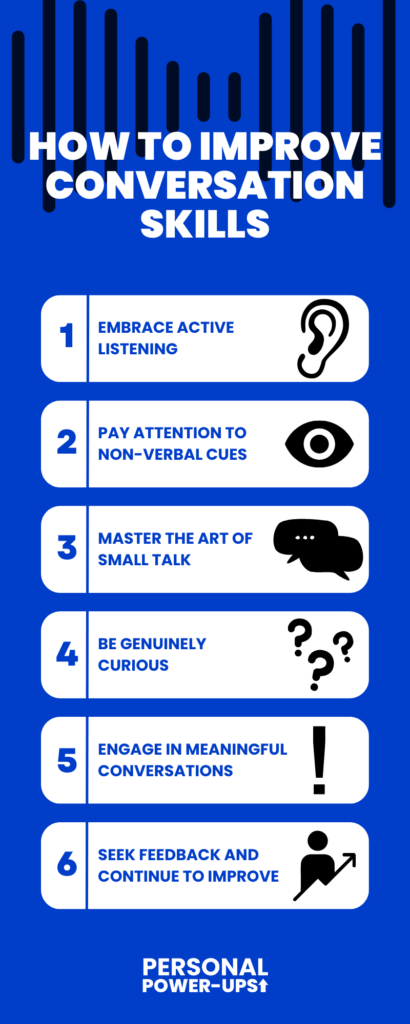We are constantly talking to others, but do you feel like you can communicate well? It’s highly likely you’ve had some communication failures in the past weeks, as happens to the best of us. Yet, we rarely reflect on and improve our conversation skills, despite these skills being incredibly important for your happiness and success.
Whether you’re networking, socializing, or simply connecting with others, honing your conversation skills can enrich your life in countless ways. Yet, many people don’t know how to improve conversation skills. So, how do you improve these important skills? Let’s dive in and get started today!
Table of Contents
Why Does Improving Your Conversation Skills Matter?
Improving your conversation skills is important for several reasons, each of which contributes to enhancing both your personal and professional life:
Building Relationships: Effective communication is the cornerstone of building meaningful relationships. Whether it’s with your friends, family, colleagues, or acquaintances, the ability to have good conversations allows you to build deep connections with them.
Career Advancement: Good conversation skills can also open doors to career opportunities. From job interviews to networking events and client meetings, the ability to communicate clearly, persuasively, and confidently will significantly impact your career in a positive way.
Conflict Resolution: Some form of conflict is inevitable in most relationships, but effective communication helps you resolve those conflicts constructively.
Enhanced Understanding: Engaging in meaningful conversations allows you to gain insights and knowledge that you may not have otherwise encountered. By actively listening and exchanging ideas with others, you broaden your understanding of diverse topics. This continuous learning process promotes your personal growth.
Boosting Confidence: Mastering the art of conversation boosts your confidence in social interactions. As you become better at initiating conversations, maintaining engagement, and expressing yourself effectively, you’ll feel more comfortable in social situations. And confidence in your communication skills translates into greater self-assurance and assertiveness in all areas of life.

How to Improve Conversation Skills
Now you know why it’s important to improve your conversation skills, let’s dive into the 6 concrete tips to improve those skills and give your social life a power-up!
1. Embrace Active Listening
One of the best ways to improve your conversation skills is by mastering the art of active listening. It’s not just about hearing the words spoken; it’s about truly understanding and empathizing with your conversation partner. Practice active listening by maintaining eye contact, nodding, and providing verbal cues to show you’re engaged. It’s also important to ask open-ended questions.
For instance, when your friend shares their recent vacation experience, instead of merely nodding along, actively participate by asking questions like, “What was the highlight of your trip?” This shows you’re genuinely interested and encourages them to share more about themselves.
2. Pay Attention to Nonverbal Cues
Effective communication extends beyond spoken words; paying attention to nonverbal communication is equally important. Your facial expressions, body language, and gestures convey as much, if not more, information than your words.
Imagine you’re in a job interview. Even if your verbal responses are great, if you sit with crossed arms and avoid eye contact, you may come across as disinterested or defensive. Instead, maintain an open posture, make eye contact, and mirror your interviewer’s positive body language to build rapport and trust.

3. Master the Art of Small Talk
Whether you love it or hate it, small talk serves as a gateway to deeper conversations. Mastering this skill helps break the ice and lay the foundation for meaningful connections. Start by initiating conversations with open-ended questions that invite further discussion.
For instance, at a networking event, instead of asking a closed question like, “Do you like this event?”, opt for an open-ended one such as, “What brings you to this event today?” This encourages the other person to share more about themselves, creating opportunities for genuine connection.
4. Be Genuinely Curious
A key trait of a good conversationalist is genuine curiosity about others. Cultivate a sincere interest in learning about your conversation partner’s experiences, opinions, and perspectives.
Suppose you’re chatting with a colleague about a project. Instead of solely focusing on conveying your ideas, take the time to ask about their insights and suggestions. By showing genuine curiosity and valuing their input, you foster a collaborative and enriching conversation.

5. Engage in Meaningful Conversations
While small talk has its place, don’t shy away from delving into deeper topics when appropriate. Meaningful conversations that explore passions, dreams, and beliefs fosters profound connections and personal growth.
Imagine you’re on a first date. Instead of sticking to surface-level topics, steer the conversation towards shared interests, values, and aspirations. This not only helps you gauge compatibility but also creates a deeper bond built on mutual understanding and respect. After all, the best way to truly get to know someone is by having these meaningful and deep conversations.
6. Seek Feedback and Continue to Improve
Improving your conversation skills is an ongoing journey. So ask for feedback from trusted friends, mentors, or colleagues to find your areas for growth. Also be sure to reflect on your interactions of the past weeks and consider how you can improve your communication style.
For example, after a team meeting, ask your supervisor for feedback on your communication during the discussion. Are there areas where you could have been clearer or more concise? Use this feedback as constructive guidance for future interactions.

Mistakes & Lessons
We’ve shared 6 concrete tips on how to improve your conversation skills, but remember that no one is perfect and you will make mistakes. That’s perfectly normal, so don’t worry about the mistakes you make. Instead, use these errors as lessons for your personal growth.
As a bonus tip to help you implement the strategies from this article: take some time after your next major social interaction to reflect on how the conversation went. Use the 6 tips in this article as a gauge to see how you’re doing and what you can improve. It can be helpful to write it down and revisit your reflection in the coming weeks, so you make sure it stays in your mind. Good luck!




